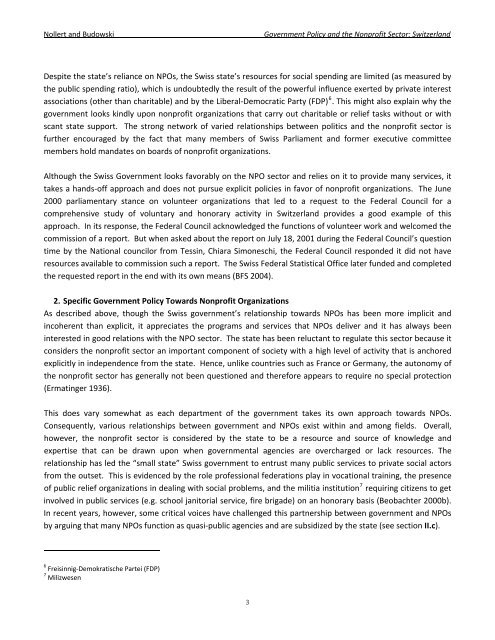Government Policy and the Nonprofit Sector: Switzerland - VMI
Government Policy and the Nonprofit Sector: Switzerland - VMI
Government Policy and the Nonprofit Sector: Switzerland - VMI
- TAGS
- nonprofit
- switzerland
- vmi.ch
You also want an ePaper? Increase the reach of your titles
YUMPU automatically turns print PDFs into web optimized ePapers that Google loves.
Nollert <strong>and</strong> Budowski <strong>Government</strong> <strong>Policy</strong> <strong>and</strong> <strong>the</strong> <strong>Nonprofit</strong> <strong>Sector</strong>: Switzerl<strong>and</strong><br />
Despite <strong>the</strong> state’s reliance on NPOs, <strong>the</strong> Swiss state’s resources for social spending are limited (as measured by<br />
<strong>the</strong> public spending ratio), which is undoubtedly <strong>the</strong> result of <strong>the</strong> powerful influence exerted by private interest<br />
associations (o<strong>the</strong>r than charitable) <strong>and</strong> by <strong>the</strong> Liberal‐Democratic Party (FDP) 6 . This might also explain why <strong>the</strong><br />
government looks kindly upon nonprofit organizations that carry out charitable or relief tasks without or with<br />
scant state support. The strong network of varied relationships between politics <strong>and</strong> <strong>the</strong> nonprofit sector is<br />
fur<strong>the</strong>r encouraged by <strong>the</strong> fact that many members of Swiss Parliament <strong>and</strong> former executive committee<br />
members hold m<strong>and</strong>ates on boards of nonprofit organizations.<br />
Although <strong>the</strong> Swiss <strong>Government</strong> looks favorably on <strong>the</strong> NPO sector <strong>and</strong> relies on it to provide many services, it<br />
takes a h<strong>and</strong>s‐off approach <strong>and</strong> does not pursue explicit policies in favor of nonprofit organizations. The June<br />
2000 parliamentary stance on volunteer organizations that led to a request to <strong>the</strong> Federal Council for a<br />
comprehensive study of voluntary <strong>and</strong> honorary activity in Switzerl<strong>and</strong> provides a good example of this<br />
approach. In its response, <strong>the</strong> Federal Council acknowledged <strong>the</strong> functions of volunteer work <strong>and</strong> welcomed <strong>the</strong><br />
commission of a report. But when asked about <strong>the</strong> report on July 18, 2001 during <strong>the</strong> Federal Council’s question<br />
time by <strong>the</strong> National councilor from Tessin, Chiara Simoneschi, <strong>the</strong> Federal Council responded it did not have<br />
resources available to commission such a report. The Swiss Federal Statistical Office later funded <strong>and</strong> completed<br />
<strong>the</strong> requested report in <strong>the</strong> end with its own means (BFS 2004).<br />
2. Specific <strong>Government</strong> <strong>Policy</strong> Towards <strong>Nonprofit</strong> Organizations<br />
As described above, though <strong>the</strong> Swiss government’s relationship towards NPOs has been more implicit <strong>and</strong><br />
incoherent than explicit, it appreciates <strong>the</strong> programs <strong>and</strong> services that NPOs deliver <strong>and</strong> it has always been<br />
interested in good relations with <strong>the</strong> NPO sector. The state has been reluctant to regulate this sector because it<br />
considers <strong>the</strong> nonprofit sector an important component of society with a high level of activity that is anchored<br />
explicitly in independence from <strong>the</strong> state. Hence, unlike countries such as France or Germany, <strong>the</strong> autonomy of<br />
<strong>the</strong> nonprofit sector has generally not been questioned <strong>and</strong> <strong>the</strong>refore appears to require no special protection<br />
(Ermatinger 1936).<br />
This does vary somewhat as each department of <strong>the</strong> government takes its own approach towards NPOs.<br />
Consequently, various relationships between government <strong>and</strong> NPOs exist within <strong>and</strong> among fields. Overall,<br />
however, <strong>the</strong> nonprofit sector is considered by <strong>the</strong> state to be a resource <strong>and</strong> source of knowledge <strong>and</strong><br />
expertise that can be drawn upon when governmental agencies are overcharged or lack resources. The<br />
relationship has led <strong>the</strong> “small state” Swiss government to entrust many public services to private social actors<br />
from <strong>the</strong> outset. This is evidenced by <strong>the</strong> role professional federations play in vocational training, <strong>the</strong> presence<br />
of public relief organizations in dealing with social problems, <strong>and</strong> <strong>the</strong> militia institution 7 requiring citizens to get<br />
involved in public services (e.g. school janitorial service, fire brigade) on an honorary basis (Beobachter 2000b).<br />
In recent years, however, some critical voices have challenged this partnership between government <strong>and</strong> NPOs<br />
by arguing that many NPOs function as quasi‐public agencies <strong>and</strong> are subsidized by <strong>the</strong> state (see section II.c).<br />
6 Freisinnig‐Demokratische Partei (FDP)<br />
7 Milizwesen<br />
3











